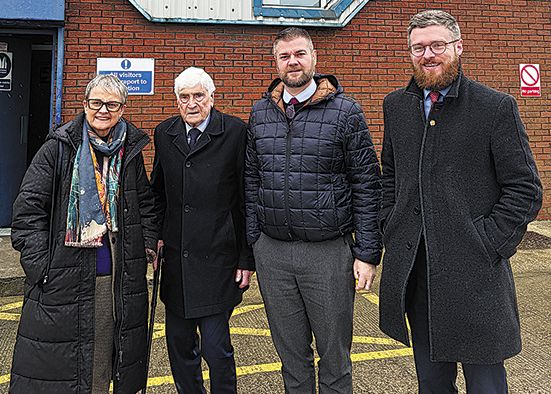Local fishing industry ‘standing on knife edge’
Local fishing industry ‘standing on knife edge’
4 December 2024

THE importance of the Ardglass fishing industry was highlighted during a special Stormont debate last week amid claims its future is “standing on a knife edge.”
South Down MLAs Colin McGrath and Andy McMurray said the village’s fishing industry played a pivotal role in the economy.
During the debate, Mr McGrath seized the opportunity to urge Stormont fisheries minister Andrew Muir to progress the delayed Fisheries and Seafood Development Programme.
The programme was published as part of a strategic review of the opportunities for developing the sea fishing and seafood sectors across the province, including the potential role of new public investment in infrastructure.
It highlights the need for investment in the region of £45m to be made available to upgrade Ardglass harbour to help maximise future opportunities.
Recommendations include enhancing capacity at the harbour to provide security for fishing and processing businesses and the need to create conditions resulting in investment in more modern fuel efficient vessels with low emissions and better facilities for crews, further reducing the environmental impact of the fleet.
Mr McGrath described the South Down fishing industry as part of the lifeblood of the local economy.
“Fishermen have been let down time and again, following the UK exit from the EU,” he said.
“The much-needed Fisheries and Seafood Development announced in 2021 had the potential to transform our industry and sustain it for the future. Minister Muir met with local representatives and industry leaders in March and committed to do all that he could to progress the programme but when the budget was announced there was no funding for fishermen.”
Mr McGrath said money also wasn’t allocated in the most recent Stormont monitoring round.
“This is totally unacceptable. During the adjournment debate, I highlighted three strands which need to be addressed if fishing in South Down is to survive as what I’m hearing from those involved in the industry is that it stands on a knife edge.
“The strands include fighting for the extension of seasonal work visas to those in the fish processing sector and addressing the disaster that is licences for fishing at Strangford Lough.”
Mr McGrath added: “The average age of local fishermen is around 60. Yet I represent a number of those leading the sector who are significantly younger and want to establish their careers in the industry, but are being prevented from doing so because these issues remain unresolved.”
Mr McMurray said the fishing industry is of key importance to rural and coastal communities, their culture and identity and an important element of the coastal economy.
He revealed that a report published three years ago revealed there were 341 fishing and seafood processing enterprises in Northern Ireland, with a turnover of £135m and the equivalent of 1,550 full time jobs.
“These activities added a gross value of £55.5m, with three quarters of this coming from businesses located in and around Ardglass, Kilkeel and Portavogie,” he said.
“Fishing also supports a range of ancillary sectors in the so-called blue economy, such as boat building and repair, fish markets and support services to offshore wind farms.”
Mr McMurray said in 2021, Ardglass, Kilkeel and Portavogie supported 240 such ancillary businesses with a turnover of £129m and the equivalent of over 1,400 full-time jobs.
He said there are “many challenges” within the fishing sector, the most significant challenge is the reliance on migrant labour and the impact of the visa regime on the Northern Ireland fish catching and processing industries.
Mr McMurray said it was estimated that almost two thirds of workers on Northern Irish fishing vessels were migrants, mostly from Ghana and the Philippines.
“Under the current visa regime, migrant workers fishing within 12 nautical miles of the UK coast and workers in the fish processing industry require a Skilled Workers’ Visa. Seafish estimate that, to make the high application costs and salaries associated with these visas viable, the wholesale price of prawns would need to increase by 33%.
“I know Minister Muir is alive to these concerns and has written to the DEFRA Secretary of State to reiterate the issues being faced across the agri-food sector in Northern Ireland in relation to immigration policy.”
Mr McMurray said that while it was important to press the UK government for change, solutions within Northern Ireland’s devolved powers should also be explored with support for the fishing industry to develop alternative and sustainable workforce solutions.
He added: “We need to support a sustainable fishing industry and develop a diverse marine sector that is able to take advantage of new opportunities.”


